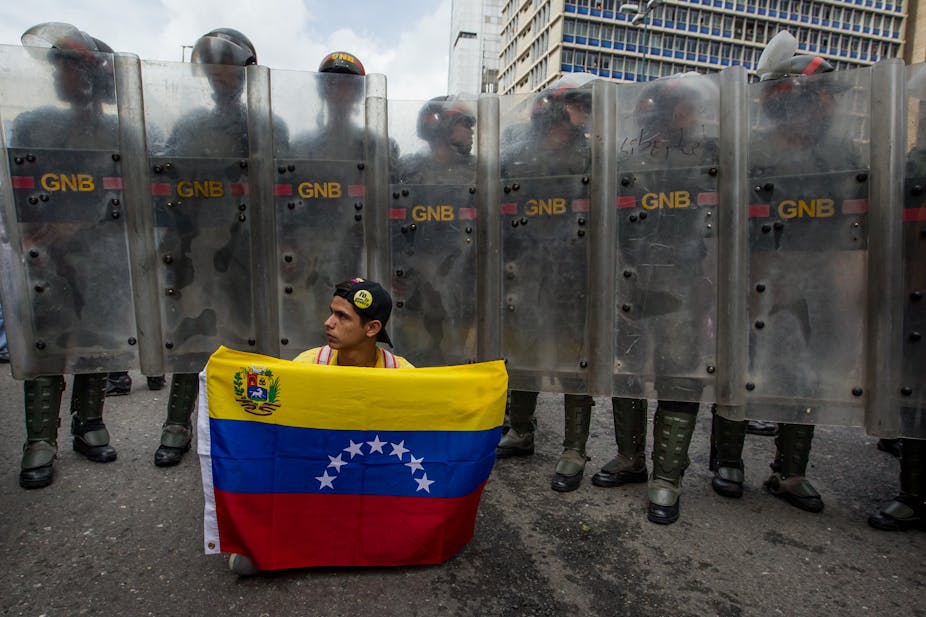The rest of the world’s view of Latin America has never been straightforward or transparent, and all the more so in a crisis. As Venezuela endures runaway inflation, food shortages and political upheaval, disingenuous polarisation is on display.
On one side, the bulk of the mainstream media coverage emphasises the themes of corruption and crisis, constantly reiterating that it’s the sometimes authoritarian “socialist project” that has driven certain Latin American countries to the brink of disaster. On the other, many left-wing voices argue that the whole thing is a US-backed confection, a neoliberal conspiracy to overthrow progressive governments that are making a difference in that continent.
Both camps make extravagant references to history: while the mainstream media invokes the collapse of state socialism in the former Soviet Union, the left points to the US’s regime change policies in Guatemala, Chile and Nicaragua. But contrary to what both sides claim, the situation is far more complex than either cares to acknowledge.
Let’s start by debunking the scaremongering against populist policies. If Latin America at large really is on the verge of another monumental economic crisis, this is not just thanks to the failure of a particular model, nor a set of populist policies gone haywire. As it has always been, the continent is highly dependent on international commodity prices, as well as on state institutions too weak to perform well in a crisis. This has all been exacerbated by the volatility of globalisation, and the rise of neoliberal ideology as the default global economic order.
Indeed, many journalists seem to forget that leaders such as Hugo Chávez did not come out from the blue. They were the result of decades of neoliberal governments who failed to modernise their economies or improve living standards.
As economist Mark Blyth has put it, austerity has been a dangerous idea throughout recent history, and particularly in Latin America. As a journalist, I witnessed at first hand the disastrous effects of the structural adjustment programmes foisted on Latin America by economists such as Jeffrey Sachs (now seemly a convert to the other side) and imposed by institutions such as the IMF and the World Bank. The 1989 riots in Caracas and the political and economic instability that followed cannot be separated from this history.
So no joy for those media outlets in Europe, such as Spain’s El Pais and El Mundo, which have splashed with a story about the chaos in Venezuela almost every single day for the past few months. As much as these media outlets would want to use the ongoing crisis in Venezuela to demonise their own leftist radicals, Pablo Iglesias’s Podemos, this simply doesn’t amount to a solid argument against anti-austerity policies.
Austerity, as many serious economists have now argued, has failed in many places across Europe as well as in Latin America. It’s a cruel fate indeed to subject the people of Spain, Portugal, Italy and Greece to these often unworkable and destructive programmes, and to punish them for their bankers’ and past governments’ corruption and incompetence.
But even with all the double standards and selective readings of history that bedivil the establishment media, the left isn’t off the hook.
Making excuses
Many of the left’s most respected voices have joined an irresponsible campaign to dampen any criticism of leftist Latin American governments with revisionism and relativism. The fact remains that these governments’ redistributive policies were unsustainable not just because of meddling by outside powers, but because most of them failed to diversify their economies or increase productivity.
If anything, their populist leaders have only undermined their countries’ institutions by insisting on indefinite re-election, taking absolute control of other branches of power, and almost completely disregarding standard legal procedure.

And yet, people such as Tariq Ali, Oliver Stone, and John Pilger – as well as many academic colleagues whom I otherwise respect and admire – have rushed to defend the indefensible.
Showing much the same sort of bias the mainstream media had shown in the past, and often speaking on networks such as TeleSur, Russia’s RT and Iran’s Press TV, they are apparently happy to side with deeply corrupt and undemocratic governments and leaders who cynically claim to speak with the voice of the people.
We’ve been here before. More than a few leftist intellectuals supported Josef Stalin, Mao Tse-Tung, the Khmer Rouge and the like, saying that it was all Western propaganda. Talking about the decline of socialism in Latin America today, some of the same voices point to the very real CIA-sponsored overthrow of Salvador Allende’s government in Chile; if it happened once, they say, it can happen again.
Which is perhaps why many of them, despite all the hard evidence of his human rights violations and deliberate targeting of civilians, are giving Maduro their support.
This is a deadly mixture of ideological blindness, political naïvety and intellectual dishonesty that does progressive causes no favour. They should know better.

